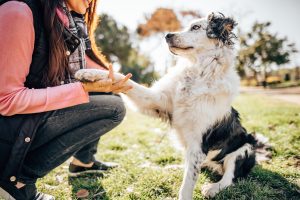
What makes a great dog trainer?
What Makes a Great Dog Trainer: Key Qualities and Skills
Finding a great dog trainer can be a game-changer for you and your canine companion. A skilled trainer not only helps address specific behavioral issues, but can also enhance the overall relationship between you and your dog. But what exactly makes a dog trainer great? Let’s explore the key qualities and skills that set the best trainers apart.
1. Patience and Understanding
- Empathy: Great dog trainers understand that every dog is unique. They approach each training session with patience, recognizing that progress takes time. They understand that they are changing the behavior of a living being and not trying to turn the dog they are working with into a robot. A great dog trainer takes a lot of things into consideration, including the dog’s past learning history, the environment the dog is living in now, and where they lived in the past, the dog’s genetics, and each dog’s individuality.
- Adaptability: They are adaptable, modifying their training plan to suit the individual dog’s learning style and pace.
2. Knowledge and Expertise
- Education: A strong foundation in canine behavior and psychology is crucial. The best trainers often have formal education from a dog training school, and certifications in animal training and behavior. These certifications should be from an independent company or school, and not from the company the trainer works for.
- Continual Learning: They stay updated on the latest training methods and scientific insights into dog behavior. All trainers who are certified from an outside source are required to earn continuing education units. Make sure you ask the trainer you are considering hiring.
3. Communication Skills
- Clarity: Effective trainers communicate clearly with both dogs and owners. They explain exercises and expectations in a way that’s easy to understand and follow.
- Active Listening: Great trainers listen to the concerns and goals of pet owners, ensuring that the training addresses specific needs.
4. Positive Reinforcement Techniques
- Force-Free Methods: The best trainers use positive reinforcement techniques, rewarding desired behaviors, rather than using punishment or fear-based tactics such as shaker cans, compressed air, prong collars, shock collars, vibration collars, choke collars, slip collars, etc. If you are not convinced that force-free is the best way to train animals, you can read the position statement on animal training from the American Veterinary Society of Animal Behavior here.
- Building Trust: This approach fosters a trusting, respectful relationship between the dog and trainer.
5. Problem-Solving Ability
- Creative Solutions: Every dog comes with its own set of challenges. Great trainers are adept problem solvers, capable of finding effective solutions to various behavioral issues without resorting to punishing the animal.
- Customized Approach: They tailor training plans to address the specific needs of each dog and situation.
6. Passion for Animals
- Love for Dogs: A genuine love for dogs is at the heart of what makes a great trainer. This passion translates into a commitment to the well-being and happiness of the dogs they train.
7. Professionalism and Reliability
- Consistency: Reliability in maintaining schedules and consistency in training methods are important for achieving successful outcomes.
- Ethical Practices: Upholding high ethical standards and transparent business practices is essential.
8. Observational Skills
- Attention to Detail: Trainers with keen observational skills can detect subtle changes in a dog’s body language or behavior, allowing them to adjust their training accordingly.
9. Compassionate and Respectful
- Respect for Dogs: The best trainers respect dogs as sentient beings with their own emotions and limits. They never resort to intimidation or humiliation.
Conclusion
A great dog trainer brings a blend of skill, knowledge, and heart to each session. They play a crucial role not just in improving a dog’s behavior but also in enhancing the bond between you and your pet. When looking for a trainer, consider these qualities to ensure a positive, fruitful training experience for both you and your dog.
This blog post aims to inform our readers about the important qualities to look for in a dog trainer, helping them make an informed decision for the benefit of their beloved pets. If you would like to learn more about Dances With Dogs, our training methods, and how we can help you, contact us at 786-599-1942 or through our website.
